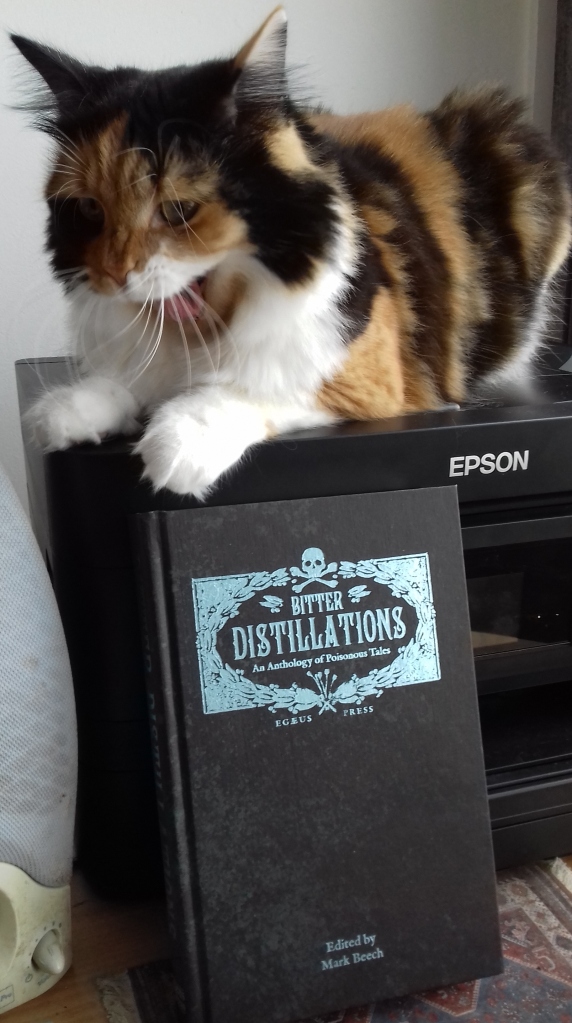So it’s a new year – with two new reviews published over January!
Renowned publisher, writer and ‘real-time’ reviewer DF Lewis has now turned his attention to Bitter Distillations: An Anthology of Poisonous Tales. Limited editions usually receive few reviews so Des’ work is especially appreciated. He writes in his real-time review of my tale The Poison Girls: “This story will surely haunt me forever, and there is so much in it for me to tell you that, in the end, you can only tell yourself.”
Des’ selection of quotes from the story points to the circumstances that surrounded its writing: I completed The Poison Girls during the first lockdown last spring and summer. Though the poison in question did not concern viruses and pandemics those considerations certainly leached into the prose. After visiting her local poison garden my character Marla painstakingly washes her hands. She notices that the gardener wears a face mask (seen on the Alnwick Castle Poison Garden website). I wouldn’t have written details about careful hand-washing at any other time. A story might be historical – and even the 2019 sections feel very ‘period’ now – but current events draw different aspects of a historical setting to a writer’s attention.
Other stories in the book are:
A NIGHT AT THE MINISTRY by Damian Murphy
THE BLISSFUL TINCTURES by Jonathan Wood
THE TARTEST OF FLAVOURS by Rose Biggin
THE DEVIL’S SNARE by Timothy J. Jarvis
THE INVISIBLE WORM by Ron Weighell
CHATTERTON, EUSTON, 2018 by Nina Antonia
OUT AT THE SHILLINGATE ISLES by Lisa L. Hannett
THE OTHER PRAGUE by George Berguño
THE JEWELED NECROPOLIS by Sheryl Humphrey
NOT TO BE TAKEN by Kathleen Jennings
THE GARDEN OF DR MONTORIO by Louis Marvick
OF MANDRAKE AND HENBANE by Stephen J. Clark
BEYOND SEEING by Joseph Dawson
I IN THE EYE by Yarrow Paisley
CANNED HEAT by Jason E. Rolfe
WORDS by Alison Littlewood
AN EMBRACE OF POISONOUS INTENT by Carina Bissett
Then a review of Helen’s Story popped up in the Deep Cuts in a Lovecraftian Vein blog! This novella, if you recall, was published in 2013 and received a Shirley Jackson Award nomination in 2014. But that was a longish time ago. It’s always a wonderful surprise when I discover a review years after a book’s publication. It’s good to know that people are still reading and indeed, discussing something I’ve written. Bobby Dee, who coordinates the blog, invites readers to find out “why this is part of the essential reading experience of the Cthulhu Mythos”.
I loved the way the Deep Cuts review explores both the tension and inspirational relationship my novella has with its source material, Arthur Machen’s The Great God Pan. “The final sentiment, the last revelation, the apotheosis or ipsissimus that Helen experiences…is utterly apt. It is both an homage to ending in “The Great God Pan” and a negation of it; because it is not an ending at all but a beginning.”
Each Saturday Deep Cuts will feature a specific work that is important to Mythos literature and lore. You’ll find a schedule here. Their definitions are broad and subtle – it’s not all tentacles and ichor in the Mythos. I am honoured that Helen was included, along with these comments in the review:
“It’s the kind of approach that the Cthulhu Mythos is built on. Stories written not just as sequels, but as commentary and expansion, to correct old ideas and add new ones… Rabinowitz knocks it out of the park in how she interweaves flashbacks that reflect on the narrative of events in “The Great God Pan” (and another Machen story, “The White People”) with the continuing narrative of what Helen Vaughan is doing in the present day.”



 Everyone… listen to this
Everyone… listen to this  The US edition of Helen’s Story is now available from
The US edition of Helen’s Story is now available from 
